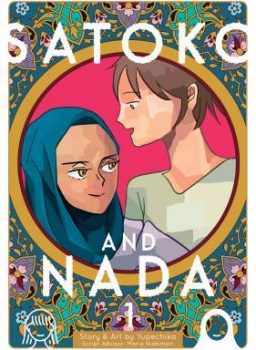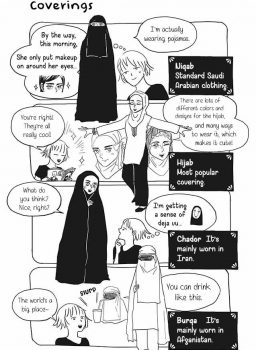 Title: Satoko and Nada (サトコとナダ)
Title: Satoko and Nada (サトコとナダ)
Author: Yupechika (Story & Art)
Script Supervisor: Marie Nishimori
Genres: Slice of Life, Comedy
Rating: Everyone
Published: 2017-2018 (Japan); 2018-2020 (North America)
Volumes: 4 [Complete]
Japanese Publisher: Star Seas Comics
English Publisher: Seven Seas Press (Seven Seas Entertainment)
Available to Purchase in English?: Yes (Indigo / Amazon / Barnes & Noble)
This Review is Based On: The first couple of volumes.
Synopsis: A story of cultural exchange between an American with Japanese origin and a Saudi Arabian roommate. The manga shows the differences in Islamic and Japanese cultures while comparing and showing that no matter how different or similar it can get, deep down humans are humans and we really aren’t that different even if we can get along or not. (MAL)
If you want a feel-good title to erase the thoughts and memories of recent events going on in the world, boy do I have the perfect manga for you.
Satoko and Nada are two foreign exchange students who have each come to America for their studies and have become roommates with each other. They share an apartment together in what I’m assuming is some kind of postsecondary dorm complex. While Satoko does provide clarification about Japanese beliefs, food and traditions from time to time, the bulk of the manga consists of Nada’s commentary about her Muslim beliefs and customs, and what life back home in Saudi Arabia is like. Man, this book is INFORMATIVE!
Which is all the better because, unfortunately, in many parts of the world there is still a lot of racism against people who don’t have pale skin. Ignorance must be combated against with information and education, and Satoko and Nada has both in spades. For example, within the first few pages the reader learns about the different types of clothing worn by Muslim women. From there the manga goes on to explore the differences between Satoko and Nada’s cultures by touching on topics like the cuisines each young woman likes to cook, and how they like to dress, style their hair, and wear makeup. Satoko and Nada also explores subjects like arranged marriages, women now being able to drive in Saudi Arabia (post-2018), the details of how Muslim men and women pray, and much more. There is even a few pages devoted to explaining the differences between different styles of Middle Eastern headpieces, and I thought that was really neat!
The manga is structured as each page consisting of a 4 panel oneshot scenario, but on occasion a oneshot will tell a larger story spanning several pages. In one such story arc, Satoko naively accepts a ride from a stranger after she misses her bus. She loses her cellphone reception during the ride, causing Nada (who has just gained her American driver’s license) to freak out that something has happened to Satoko after she recalls hearing news stories about young women who’ve gone missing in America. Shortly thereafter, Satoko realizes that the driver is taking her in the opposite direction of where she wants to go but is unable to exit the situation on her own. Thankfully Nada finds Satoko and steals her away to safety in the blink of an eye. A hard lesson learned but thankfully Satoko and Nada both get home safely.
In addition to being a very positive, wholesome manga, I found Satoko and Nada important on the basis of representation as well. I’m embarrassed to admit that while I have a few friends and coworkers who wear a hijab, I can’t think of many examples of media where a Muslim character is either the main lead or one of the stars of the show. And really, why aren’t there more examples? Why isn’t the general public learning more about Muslim beliefs and practices? Would it not help combat racism, ignorance and prejudice towards people who share that religion?
There is a Goodreads reviewer who said that their main criticism of this series is that it doesn’t go into more detail about the sexism and misogyny endured by many Muslim women, and while I agree with that feedback, I feel that delving into darker topics would change the tone and flow of the manga. If grittier topics like sexism and misogyny were covered in greater detail, then the manga would lose its feel-good fuzziness and that would ultimately make for a different story. Also, I feel that such a darker tone would be more appropriate if Nada and Satoko were staying in America longer. Satoko and Nada are only in America for a set period of time, therefore the degree to which some topics like hiring discrimination and arranged marriages are introduced provide a good introductory amount of information for the reader. If the reader wants to learn more about racism, discrimination and sexism towards women in both Japanese and Muslim cultures, then I feel that Satoko and Nada gives them a decent starting point from which to learn more.
Lastly, the art style of Satoko and Nada is on the simpler side, but is straightforward and easy to interpret in its own right. No complaints from me at all. ^_^v
Do I Recommend This Title to Others?: Yes! It’s a refreshing and educational look at (primarily) both Muslim and Japanese customs, and the friendship between Nada and Satoko is very fluffy and wholesome. These two young women are friendship goals and relationship goals, and even though their time together must eventually end when their studies in America end, hopefully they can still visit each other in the future.
Final Score: 9.5/10


I love this series! It’s very cute and I learned quite a bit from it. Mostly, I just love the portrayal of the friendship between Nada and Satoko and I teared up while reading the ending.
I enjoyed the manga for both of those reasons too! Nada in particular strikes me as having a very vibrant personality. She was definitely my favourite character. I haven’t read the ending yet but I hope to eventually!
As a muslim, I’m so happy there’s a manga that portrays muslim and Islam so positively. It’s very rare to find a manga like this. And I also learned that Saudi Arabia has more stricter rule than my country. And of course, I enjoy Nada and Satoko’s friendship.
I’m glad you enjoyed the manga as well. I love it for being such a positive portrayal of Islam and Muslim people too. Nada and Satoko are friendship goals. 🙂